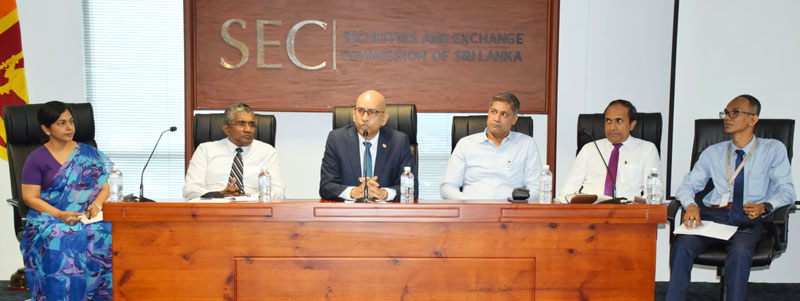Thursday Feb 19, 2026
Thursday Feb 19, 2026
Thursday, 21 September 2023 03:35 - - {{hitsCtrl.values.hits}}

SEC Chairman Faizal Salieh (fourth from right) presides over the meeting with owners and CEOs of stock broking firms. Others (from left) SEC Supervision Director Dilum Mahawatte, Director General Chinthaka Mendis, CSE Chairman Dilshan Wirasekara, CEO Rajeeva Bandaranaike and SEC DDG Tushara Jayaratne
The Securities and Exchange Commission (SEC) Chairman Faizal Salieh, along with his top officials and from the CSE, recently held a productive engagement with the stockbroker community to discuss vital matters concerning the industry.
The meeting, which brought together owners and chief executive officers of stockbroker firms, was aimed at enhancing regulatory compliance, promoting healthy market practices and ensuring industry sustainability.
Salieh underscored the significance of establishing strong governance structures and the minimal governance standards that would apply to market intermediaries with effect from 4 July, with a 6 months transition period to fully comply. To ensure Board independence and impartiality during a conflict of interest, all market intermediaries (including stockbrokers) are required to have a minimum of three Directors of whom at least one shall be a Non-Executive Director.
Where the roles of Chairman and CEO are combined, an Independent Non-Executive Director shall be appointed as the Senior Independent Director (SID) with powers equal to the Chairman enshrined in a Board approved policy and Terms of Reference, so that intervention by the SID is facilitated during Board proceedings where there is a perceived conflict of interest.
In order to ensure that the industry offers sound client service, the quality of Registered Investment Advisors (RIAs) was discussed. The SEC Chairman mentioned that the SEC will be increasing its focus on and strengthening the annual fit and proper assessments of RIAs at the point of renewing stockbroker licences. He encouraged the stockbroker community to work towards making the industry more attractive for the employment of high quality RIAs.
The importance of the compliance role at the market intermediary level was discussed. SEC officials stated that some intermediaries do not have a thorough understanding about the compliance requirements and the role of compliance officers. Compliance officers are required to be independent of general operations and should directly report all compliance related matters to the Board.
They emphasised the need for all intermediaries to ensure that such reporting lines are effectively established.
The SEC Chairman highlighted that the main reason for inviting the owners of the stockbroker firms to the meeting was to draw their attention to the need for institution building in order to ensure the sustainability of the stockbroking industry. It is essential that the stockbroking industry moves forward with the development in technology and make continuous enhancements to their infrastructure. In this context, the SEC Chairman suggested that a considerable percentage of the profits, made by the stockbroker firm (at least 25%) should be ploughed back towards institutional development expenditure.
Discussing the role of stockbroking firms in market development, the Chairman called upon the firms to submit their annual business plans to the SEC and stated that this will be a requirement at the point of renewing stockbroker licences. Additionally licences will not be renewed for inactive stockbroking firms.
The SEC Chairman re-emphasised the need for stockbrokers to develop in-house research capabilities so that investment advisors can support their advisory roles with high quality research to guide investors. He further mentioned that a proper research arm is a prerequisite for granting and renewing of licences to a stockbroking firm under the current SEC Act.
The discussions included the current status of order management and broker back office systems with a view to improving operating processes, market efficiency and regulatory compliance.
By engaging with market stakeholders the SEC aims to strengthen the regulatory process, enhance mutual understanding, and build trust and confidence in the capital market.
